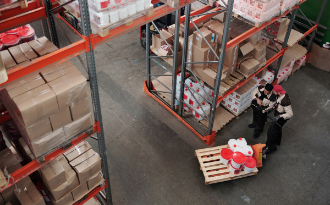The Ever Given, one of the largest container ships in the world, was recently pulled free from the Suez Canal after cutting off traffic in the vital waterway for six days. Still, experts say the disruptions to global trade will continue to ripple through the global supply chain world for a long time.
We can look forward to backlogged ports, slowed delivery mechanisms, higher fuel costs, longer delivery times and more; riding on the back of the already-existing container shortage and the global pandemic, we will likely see chaos that will continue to disrupt supply for the foreseeable future. Supply chain resilience is truly being tested for many businesses.
The ship, approximately the size of the Empire State Building, became horizontally wedged in the canal forcing crews to work night and day to free the vessel, which ultimately took ten tugboats and special dredging equipment to free the vessel. So, while traffic has now resumed in the key waterway, the repercussions after days of halted movement will continue moving forward. Around 12% of global trade flows through the Suez Canal on massive ships like the Ever Given, which can hold 20,000 containers. That’s roughly $9 billion worth of goods a day, or about $400 million per hour.
How can we augment and even embrace the upcoming discord? Today’s complex supply chain operations must be well-choreographed to generate, feed, process, update, receive and disseminate information at every stage. From sales, order fulfillment, shipping, replenishment, inventory, tracking to finance and beyond, all areas must be part of a complete enterprise management and supply chain resilience strategy.
There are appropriate technology attributes to react to upcoming supply chain disruption:
- Real-time visibility:You need immediate access to the latest information to enable quick response to changes, provide continuous improvements, and hold everyone accountable.
- Flexibility:Businesses must have the freedom to choose the tools that fit their needs, direction and budget. Technologies should empower users — not limit their decisions.
- Integration:Technologies, tools and processes must be seamlessly connected so that information can flow across systems, departments and processes to update, track and manage the entire operation.
- Scalability:All technology must be configurable, affordable and be able to scale to support future needs.
No doubt, this is going to be a year of challenges and changes for many companies. If we’ve learned anything, it’s that it’s best to be prepared for anything. At Withum, we advise large and small companies in the manufacturing, logistics, and distribution industries, helping clients master the upcoming strife.
Contact us to schedule a consultation.
Management Consulting Services



